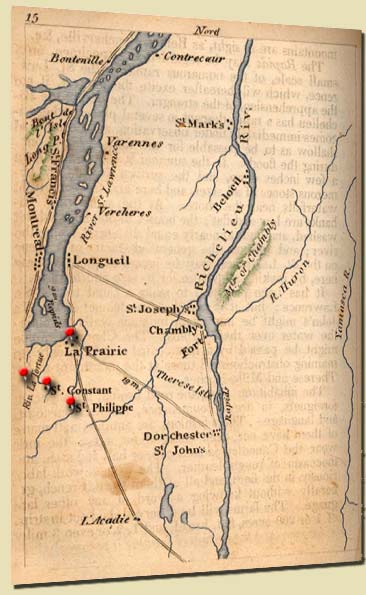Joseph and Charlotte.
Joseph-Antoine Pétel was born June 12, 1787 in St-Phillipe-de-LaPrairie, in the Province of Québec. He was the son of Pierre Pétel and Marie-Josephte Bulteau; his godparents were Ignace Roy and his aunt Marie-Louise Bulteau (Josephte's sister). They would take responsibility to raise the boy in the Catholic faith if his parents died before he was grown.
The war between the Kingdom of Great Britain and thirteen of its North American colonies had ended four years earlier in 1783 with the signing of the Treaty of Paris. Thousands of United Empire Loyalists fled to Canada, swelling the ranks of the English-speaking population. The Ottawa River served as the dividing line for the two provinces of Upper and Lower (or Bas) Canada as set out in the Constitutional Act of 1791. The Act separated the largely French-speaking Québec from the English in Ontario, intending to lessen the stress that came with the clash of cultures. But the peace with the new nation to the south would not last.

War of 1812.
On 10 February 1812 Joseph married Charlotte Pinsonneau in Saint-Constant-de-LaPrairie, Bas Canada. They were third cousins, both great-great grandchildren of Clément Lériger, dit LaPlante who had arrived in Québec in 1685 with the Troupes de la Marine. Charlotte was born and baptized at Saint-Phillipe-de-LaPrairie on 4 September 1792, the second child of Paul Pinsonnault and Marie-Charlotte Lériger, dite LaPlante. Her mother died when she was just thirteen. Joseph's father passed away in 1810.
A few months after their marriage, on June 18th, the fledgling United States declared war on the British Empire over trade disputes and the impressment of its sailors into the British Royal Navy. At age 25, Joseph was eligible for the Canadian militia. There is evidence that two of his brothers-in-law served, as their names appear on a list of veterans who received a gratuity of $20.00 in 1875: Paul Pinsonneau, a member of the Beauharnois battalion was the brother of Joseph's wife, Charlotte. And Paul Reichembach, who wore the blue coat of a Voltigeur, was married to his sister, Marie-Josette Petel. They were perhaps enrolled by recruiters who sought men on the church steps after Sunday service or at neighborhood taverns. Battles that took place in their vicinity included the 1813 Battle of Chateauguay and the 1814 Battle of Lake Champlain.
Had Joseph served with the militia, he certainly did not stray far from home as two children were born in this period: Joseph in April 1813 and Marcelline in May 1815. Both were baptized at Saint-Constant.
The War of 1812 was mercifully brief; it ended with the Treaty of Ghent on December 25, 1814.
Their next two children were baptized in LaPrairie, though the church records indicate the family still lived about 5 miles away in Saint-Constant. Their son Narcisse died at the age of four and was buried from the church in Saint-Constant in August 1821. It was not uncommon for a subsequent child to be given the name of one who died, and so it was with our ancestor.
- St-Phillipe-de-LaPrairie church records
- Saint-Constant de LaPrairie, FHL US/CAN 1711392
- Saint-Phillipe-de-LaPrairie Church records
- Map:Canada - Lower 1830, Perry-Castenada Library, From The Northern Traveller, and Northern Tour; with the Routes to The Springs, Niagara, and Quebec, and the Coal Mines of Pennsylvania; also, the Tour of New-England. New York, 1830. This image has been altered to better represent the subject matter.
- Bulletin des recherches historiques transcribed by Michel Trebor (geocities site) (accessed May 16, 2009)
- https://www.collectionscanada.gc.ca, War of 1812: Lower Canada Nominal Rolls and Paylists, RG 9 1A7, Mikan Number:133532
